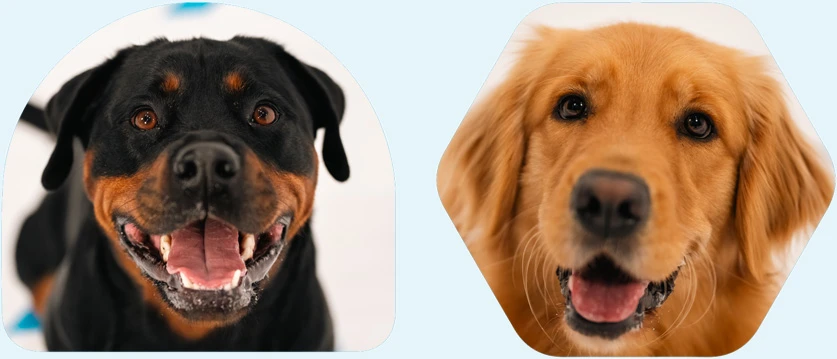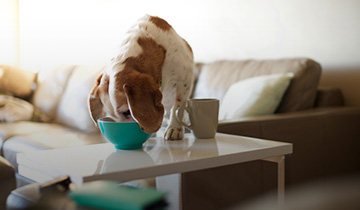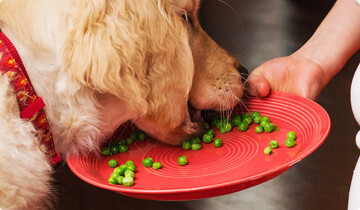For thousands of years, dogs and cats (and other creatures) have been part of the human family/whānau, helping us hunt, move about, protect our own herd from predators and provide companionship.
It can also be said, though, that in some cases our pets have come to control us – rather than the other way around. They use their deep, soulful eyes to persuade us to give them treats, take them for walks, let them up on the bed and to say “it wasn’t me” when they’ve torn through the carpet or chewed on a chair leg. In a nutshell, they control our minds, when it should be the other way around.
Last year we launched the Paws Off! project to help educate owners and pet carers on the do’s and don’ts around sharing human foods with pets. A year later and we’re stepping things up a notch. We’re focusing on spotting the signs of Pet Mind Control and finding the power to ignore the temptation to share, no matter how fuzzy it makes us feel inside.
Anthony McPhail, our CEO, said, “Paws Off! is designed to remind owners not to give human food and drink to their pets, as they can be toxic. As one of the participants in the Mind Control video (see above) states, “pet food is clearly labelled ‘not for human consumption’, while human food isn’t labelled, ‘not for pet consumption’”. Many New Zealanders unwittingly end up making their cats and dogs sick by giving in to their pleas.
“In 2023 alone we paid out claims of more than $3,000,000 to help dogs and cats who had digestive or ‘alimentary conditions’ (meaning something wrong with their digestive tract). Many of these pets had eaten foods which are delicious and OK for us, but toxic and dangerous for our pets. So, with our partner the NZ Veterinary Association, this new Mind Control campaign has been created to share even more information and proven tips and tricks to take back the power in the relationship with our pets.”
Sally Cory, Head of Veterinary Services at the NZ Veterinary Association said, “Time and time again vets come to the rescue of persuasive dogs and cats who have bitten off more than they should chew. Humans are responsible both for leaving things lying around and for giving in to their pets’ demands for foods they really shouldn’t eat. The consequences can be tragic, so it’s essential we teach owners to know what not to do, as much as we advise them on what to do should their pet eat something they shouldn't have, along with steps they can take to keep their pets safe and well.
“With cats, it’s relatively easy – keep toxic foods and things like lilies away from your purry friend as much as you are able to. We do understand that it is difficult to control what your cat may access outside. However, with dogs, who seem to have even greater persuasive powers than cats, it’s ‘you’ the owner who needs to take back control around food, drinks and other things which can be dangerous, even deadly.”
Cory also points out that succumbing to those beseeching looks and overfeeding and overtreating can be dangerous over time. “Overweight pets, like humans, can suffer from increased pressure on their joints, and an increased risk of other health issues like diabetes and heart disease. This may can all lead to a life that’s painful, exhausting and shortened, rather than fun, energetic and rewarding. Sometimes it’s just cruel to be kind.”
What to do if you suspect your dog has eaten something it shouldn’t have
If you know for sure your dog has eaten something dangerous, or is having trouble breathing, call your vet. If you are not sure and they’ve just come slinking home or are not their usual happy selves, their behaviour will give you some clues as to what they’ve been up to.
The first clear signs that a dog has eaten something that has not agreed with them are vomiting, diarrhoea, drooling, appetite loss, lethargy and generally being unsettled or shaking. They may also paw at their mouth, whimper, whine, sit or sleep in unusual places or appear hunched, bloated or stretch repeatedly. Some dogs may try to throw up whatever they have eaten. Whatever the case, get in touch with your vet or an emergency vet service.
Training tips for your puppy or dog
Sally Cory said, “It’s never too late to train your dog if the uncomfortable truth is that they've actually trained you. The trick to success is a combination of removing temptation, ensuring they have plenty of exercise and distraction and teaching your pooch that they can leave something they consider to be a treat, to get an even better one. That may even be a hug or ear scratch, rather than food!”
- Get outside to walk and play every day – this keeps your pup’s or dog’s mind focused on adventure and not on food. It’s also good for you and your family’s fitness. Make sure you change where to go so you all get a fresh perspective and meet other people and their dogs. In fact Southern Cross Healthy Futures research shows 88 per cent of New Zealanders say pets are good for their own health and wellbeing.
- Exercise their minds by teaching them tricks they can perform when you are out and about, such as jumping up onto different heights like park benches and seats (when there’s no human on them), to walk at your heel, to come when called, or to fetch a ball or another safe throw toy.
-
If you have a problem with your dog grabbing food from a countertop or the rubbish bin – here’s a method to change that bad habit. It takes repetition, gentleness and patience
- Place a small healthy treat in the spot your dog keeps going to. Take your pooch to the spot and tell them to ‘leave it’. Then walk away, wait a few seconds, then call your dog. If your pooch walks away from the treat and comes to you, take them back to the spot and give her / him the treat along with plenty of praise and pats
- If he or she just can’t resist and grabs the treat, repeat the whole thing as many times as you need to until they follow your instructions. Be patient! And make sure every family member is in on the training too. You all need to be in on the mind control!
- Make sure your family know about food safety, how to make sure your dog doesn’t get into the rubbish and being smart with where they keep their food (or hiding their mouldy school sandwiches).


